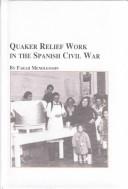Book Review: Quakers & the SCW
 Quaker Relief Work in the Spanish Civil War. By Farah Mendlesohn. Lewiston, NY: The Edwin Mellen Press, 2002. During the Spanish Civil War, in the face of the enormous civilian suffering, a number of non-governmental international organizations stepped in to perform relief work. Many of these supported one side of the conflict or the other; the North American Medical Bureau to Aid Spanish Democracy, for instance, sided with the Republicans, while the English Bishops’ Committee for the Relief of Spanish Distress helped the insurgents. In contrast, two Quaker organizations, the British-based Friends Service Council (FSC) and the American Friends Service Committee (AFSC) were committed to giving assistance to victims of the war on both sides. It is their history that Farah Mendlesohn tells in this interesting study.
Quaker Relief Work in the Spanish Civil War. By Farah Mendlesohn. Lewiston, NY: The Edwin Mellen Press, 2002. During the Spanish Civil War, in the face of the enormous civilian suffering, a number of non-governmental international organizations stepped in to perform relief work. Many of these supported one side of the conflict or the other; the North American Medical Bureau to Aid Spanish Democracy, for instance, sided with the Republicans, while the English Bishops’ Committee for the Relief of Spanish Distress helped the insurgents. In contrast, two Quaker organizations, the British-based Friends Service Council (FSC) and the American Friends Service Committee (AFSC) were committed to giving assistance to victims of the war on both sides. It is their history that Farah Mendlesohn tells in this interesting study.
In the past, their commitment to the Quaker “Peace Testimony” had led American and British Friends to assist both the victors and the vanquished in the aftermath of a war. This was the first time that they served both sides in an ongoing war. In the cities of Barcelona, Valencia, and Murcia, located in the Republican zone, the FSC and the AFSC distributed milk and dried food to refugee children, pregnant and nursing women, and the elderly. In addition, in Murcia, under the energetic leadership of Francesca Wilson, the British Friends also set up a children’s hospital and workshops where the refugees could make clothing for themselves. While the FSC was not allowed to operate in Nationalist Spain, the AFSC set up a mission in Burgos. The Nationalist area, which had most of the agricultural land and very few of the refugees, did not need additional food supplies—at least in the first months of the war. The primary aim of the AFSC presence there was to ensure neutrality.
One of the most interesting aspects of the book lies in the difference in the Quakers’ experiences in the two zones. In the Nationalist area, the rebel authorities were opposed to the establishment of non-Falangist and non-Catholic canteens, obliging the AFSC to channel relief through the Falangist Welfare Service, Auxilio Social. The arrangement caused tensions within the Quaker relief unit. While Howard Kershner, the AFSC representative who coordinated the work of all relief agencies in Spain, believed that the Nationalists were civil and doing a great job, many of his colleagues resented being excluded from direct relief, as they could not guarantee the impartial distribution of aid. Adding to their resentment was the fact that the Nationalist authorities violated their agreements by reportedly exchanging wheat provided by the AFSC and other agencies for German munitions. The situation further deteriorated after the insurgents conquered Republican-held territory. In Murcia, the military confiscated relief supplies and closed the children’s hospital, and in Valencia, the police arrested the AFSC representative, Emmet Gulley. The main accusations leveled at the Quakers were that they were “Reds” and of lax morality. With the outbreak of World War II, the position of Friends workers became increasingly precarious and they began leaving Spain. The AFSC stopped relief work in Spain, using its funds instead to administer colonies of Spanish children in France and to assist Spanish refugees in Mexico and North Africa.
Mendlesohn’s account demonstrates how difficult it was for any individual or organization to remain impartial during the Spanish Civil War. It also adds valuable information to our knowledge of the refugee crisis that accompanied the conflict.
Isabelle Rohr is the author of The Spanish Right and the Jews (1898-1945): Antisemitism and Opportunism. She is a visiting lecturer at King’s College, University of London, and at St. Mary’s College, University of Surrey.












